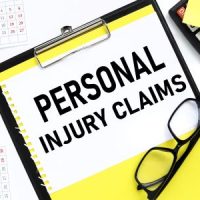What is a Florida Personal Injury Claim?

Accident victims who suffer serious injuries because of someone else’s carelessness often end up shouldering hefty financial burdens in order to cover their accident-related medical bills, property damage, and lost wages. This can seem (and is) unfair, which is why those who can prove that someone else was responsible for their accidents can often recover compensation for their losses by filing a personal injury claim in court.
Types of Personal Injury Cases
Personal injury cases arise when one person suffers harm because of another person’s actions. Most personal injury claims stem from a few different types of accidents, including:
- Car crashes;
- Truck collisions;
- Motorcycle crashes;
- Pedestrian accidents;
- Bicycle accidents; and
- Slip and fall accidents.
Unfortunately, these are not the only types of accidents in which unsuspecting victims can be injured. Some, for instance, sustain injuries due to medical negligence, while others suffer injuries while using defective consumer products. While the person or entity that can be held liable for these kinds of accidents will vary depending on the incident in question, all of these kinds of claims still fall under the broad umbrella of personal injury law.
The Elements of a Personal Injury Case
Before an accident victim can pursue damages from an at-fault party, he or she will need to provide evidence of that person’s negligence. This in turn, will require that the claimant prove that:
- The at-fault party owed the victim a duty of care, which will vary depending on the circumstances;
- The at-fault party breached that duty of care by behaving carelessly;
- The at-fault party’s breach caused the victim’s injury; and
- The victim suffered damages (physical or financial) as a result of the at-fault party’s actions.
Only when a claimant can prove that these elements have been fulfilled can he or she recover damages for accident-related losses, such as medical bills, lost wages, property damage, and pain and suffering.
Comparative Negligence Rules
There are specific laws in Florida that could affect the outcome of personal injury claims. For instance, just because a person contributed in some way to his or her accident does not mean that he or she will automatically be barred from recovery. This is because Florida adheres to the modified comparative negligence standard, which means that in a case where a claimant’s own negligence contributed to his or her accident, his or her recovery will be reduced in proportion to the degree of negligence exhibited. If, however, an accident victim’s percentage of fault in causing the accident exceeds 50 percent, then that person will in fact, be barred from recovery.
Call Today for Legal Assistance
At Anderson & Anderson, our experienced Tampa personal injury attorneys, with the support of our staff, have been helping accident victims pursue their rightful compensation for almost 40 years. Let us put our resources and experiences to work in your own case and set up an appointment today. You can reach us by calling our office at 813-251-0072 or by sending us an online message.
Sources:
law.cornell.edu/wex/personal_injury
flsenate.gov/Committees/billsummaries/2023/html/2949
